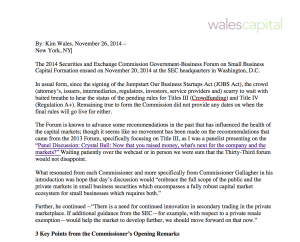The SEC Adopts JOBS Act Title IV: Regulation A+
By: Kim Wales (NY) — 03/25/2015
Today marks another milestone in the life cycle of the Jumpstart Our Business Startups Act (JOBS Act) — Regulation A+ is approved. With the three-year anniversary only two weeks away and after many recommendations submitted by myself and fellow colleagues, the Securities and Exchange Commission voted unanimously on the adoption of Title IV: Regulation A+ for small securities offerings. This is a big step towards furthering the democratization of the capital markets for emerging growth companies.
“These new rules provide an effective, workable path to raising capital that also provides strong investor protections,” said SEC Chair Mary Jo White. “It is important for the Commission to continue to look for ways that our rules can facilitate capital-raising by smaller companies.”
Tier 1 offerings will be subject to federal and state registration and qualification requirements, and issuers may take advantage of the coordinated review program developed by the North American Securities Administrators Association (NASAA).
The rules will be effective 60 days after publication in the Federal Register.
Here are some highlights for the adoption of Regulation A+. Both Tiers are subject to certain basic requirements while Tier 2 offerings are also subject to additional disclosure and ongoing reporting requirements.
1. State Blue Sky preemption and qualification requirements for securities offered or sold to “qualified purchasers” in Tier 2 offerings.
2. Tier 1 issuers can raise up to $20m rather than the limited $5m maximum in a 12-month period, with not more than $6 million in offers by selling security-holders that are affiliates of the issuer. The coordinated review process by NASAA will only be used for tier 1 offers.
3. Tier 2 offers and issuers can raise up to $50m in a 12-month period, with not more than $15 million in offers by selling security-holders that are affiliates of the issuer.
3. Regulation A+ offerings are exempt from the mandatory 12(g) registration thresholds – so long as the issuer engages services of a registered transfer agent, remains subject to and current in a tier 2 reporting obligation and meets public float and revenue requirements similar to those in small reporting companies and exchange act rules. The details of the reporting rules should be included in the final rules.
4. The JOBS Act mandates the Commission to review Tier 2 limits every two years.
5. Issuers raising capital using Regulation A+ may submit draft offers to the SEC staff, use electronic filing process on EDGAR, ability to use test the waters solicitation materials both before and after the filing of the application process.
6. Additional Tier 2 Requirements:
– Financial statements included in the circular will be audited annually.
– Semi and annual outgoing reports and current event updates that are scaled to Regulation A offerings.
– Limit the number of securities, non-accredited investors can purchase, up to 10% of the greater of annual income of net worth natural person; and
– Limit the purchase of 10% of the greater of annual revenue or net assets of unnatural persons.
– Issuers will use Form 8a — short form registration statement concurrently with a qualification Regulation A offering statement to register securities class 12(b) or 12(g) of the total package of investor protections to be included in the implementation of Reg A offer.
“Moving Title IV forward is a positive step in stimulating the economy, however, start-ups will still find it challenging to raise money using Reg. A because the cost and process remains burdensome for this stage of company, says Kim Wales, founder of Wales Capital.” As an advocate for the JOBS Act and policy reform, “we still need to get the rules released for Title III and raise the limits up to $5 million and exclude investment limits for accredited investors” as prescribed in my recommendation letter “Limitation of Capital Raised,” February 23, 2014. “This is the part of the JOBS Act that will help all people.”




